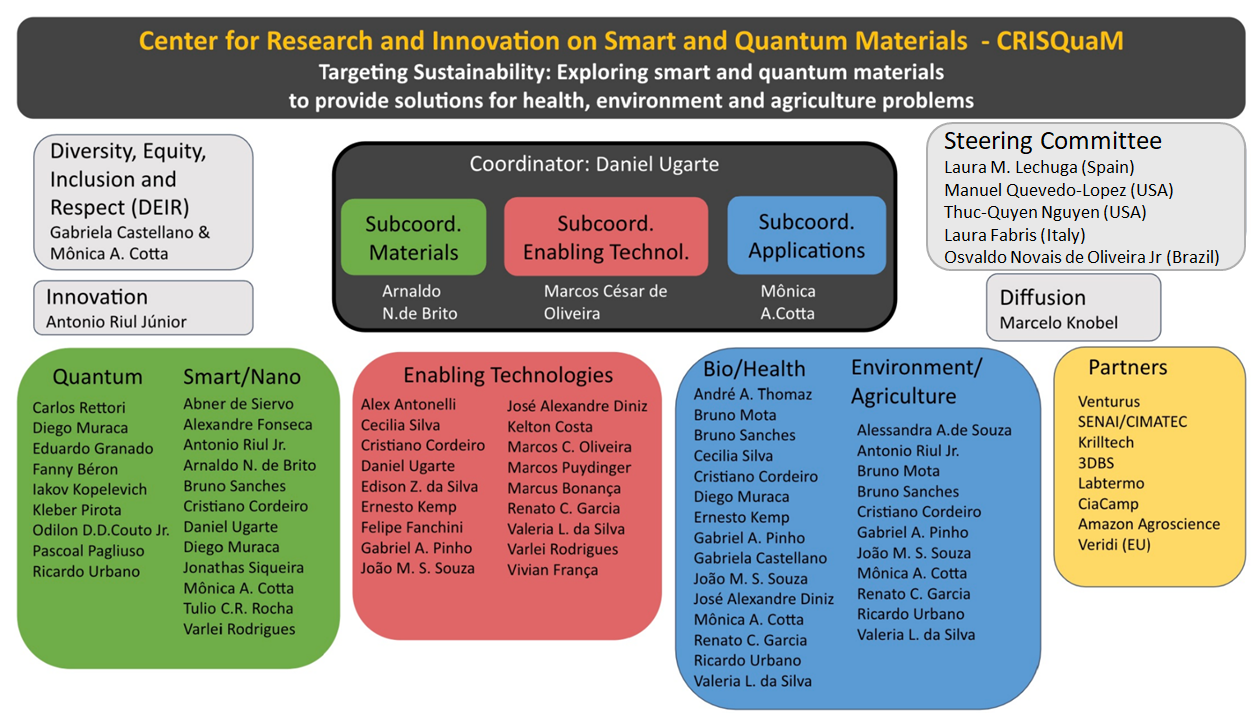BV-FAPESP: research projects supported in this Center
CRISQuaM in the Media: news about the center
CRISQuaM aims to explore the synergistic development of fundamental and applied science to create new materials with high potential for the construction of devices and sensors to address technological challenges related to sustainability, climate change, precision agriculture, ecology, and health. To achieve these goals, we have assembled an interdisciplinary and collaborative research team, integrating expertise across various scientific domains, researching novel materials with high innovation potential. By combining original synthesis methods, advanced characterization techniques, theoretical approaches, computational simulations, quantum technologies, and device construction designs, we aim to drive advances in smart and quantum materials, promoting scientific excellence and technological development. With this, we plan disruptive innovations in instrumentation—including hardware and AI-based tools—as well as in quantum technologies, biomedical devices, and signal processing, in addition to plant bionics, exploring plant-pathogen interactions. Besides research activities, we plan intensive actions in education, dissemination, and communication for the general public, as a modern society should be aware of the challenges humanity faces and how research and technology are essential for responsibly utilizing the planet's limited resources. CRISQuaM's Innovation activities are accelerated through partnerships with several companies in related technologies, many of them Brazilian. Finally, all activities of the Center are managed in accordance with diversity, equity, and inclusion goals and best practices.
The Center brings together scientists, engineers, and innovators in a collaborative effort to apply materials science and quantum technologies at the cutting edge, designing new materials and nano(bio)sensors for advanced diagnostics. The Center has a team capable of producing a wide range of (nano/micro) materials, along with precise chemical and physical characterizations using modern techniques (synchrotron, advanced microscopy, magnetotransport, magnetic resonance, optics, etc.). In addition, the team offers various options in enabling technologies, including miniaturization, processing, and additive manufacturing, as well as instrumentation, quantum sensing, and electronics development. Data analysis will employ updated approaches (numerical simulation, classical and quantum machine learning, and quantum optimization). Applications at the knowledge frontier will address urgent sustainability needs in environmental areas, precision agriculture, plant bionics, and biomedical interfaces, contributing to the development of local technologies in close partnership with the Brazilian industry.
The organization of the Center is based on three pillars — Materials, Enabling Technologies, and Applications — together with partner companies, as described in the figure below.

2023-09-06
Researchers sampled oysters and mussels at three locations between the port of Santos and the nearby city of Guarujá. Their aims included assembling data as a basis for public policy on basic sanitation. The law does not currently require removal of microplastic particles from sewage.
2023-09-06
Researchers at the Federal University of São Paulo analyzed saliva, oral microbiota and dental health of volunteers who were preparing for gastroplasty and after the operation. The results showed an increase in caries and periodontitis, as well as alterations in salivary inflammatory markers.
2023-09-06
Applications of specialty glass range from astronomy to medicine, as well as data and power transmission. The study combined spectroscopy and computational modeling to show how the structure of the material is affected by addition of niobium oxide.
2023-08-30
A study by researchers at the State University of Campinas and Harvard University shows that despite the presence of invasive strains of Saccharomyces cerevisiae, all of them belong to the ethanol fermentation environment, keeping the industrial process stable. Their findings can help cut costs and assure better results for producers.
2023-08-30
Heitor Cantarella was a member of BIOEN-FAPESP’s steering committee for 14 years. As a researcher at the São Paulo State Institute of Agronomy in Campinas, he has made groundbreaking contributions to efforts to reduce greenhouse gas emissions in agriculture.
2023-08-30
In experiments with mice, researchers at the State University of Campinas observed alterations in feed consumption, weight gain, anxious behavior and an increase in central nervous system, adipose tissue and liver inflammation.
2023-08-23
Researchers at the University of São Paulo investigated the effects of five concentrations of glitter on two strains of cyanobacteria. Use of the material in makeup, party costumes and decorations should be reconsidered, they argue.